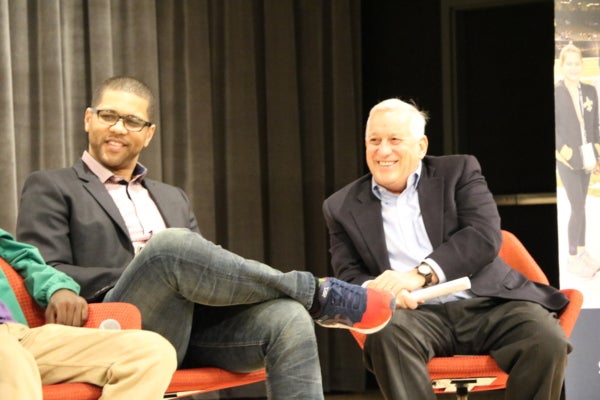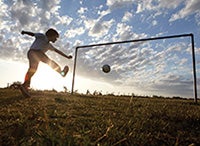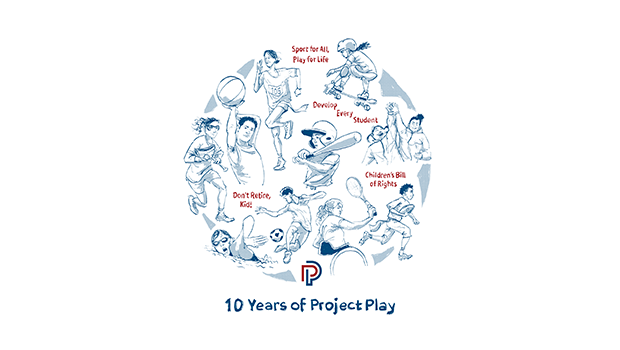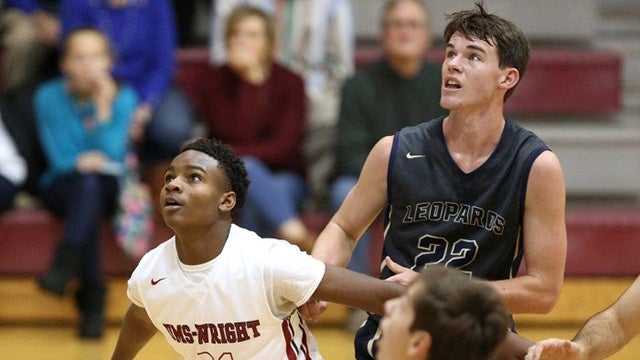Michael Smith and I met on the set of E:60, as two of the original correspondents on the ESPN newsmagazine show. That was in 2008 and since then, he’s gone on to even bigger things. He’s now a major voice in the ESPN universe, as co-creator with Jemele Hill of the successful His & Hers show, and in January they’ll bring their smart brand of debate to SportsCenter, taking over the 6 pm show. I moved on to Outside the Lines, and the Aspen Institute, launching its Sports & Society Program in 2011.
We like smart dialogue, leading to smart solutions, at the Aspen Institute. So when our program partnered with the Laureus Foundation to support their New Orleans Sport for Community Good Summit on December 6, I knew Michael was the right guy to engage. He grew up there, and cares about the place. We’re excited to have him join us as featured speaker, in conversation with Aspen Institute CEO Walter Isaacson, another son of the city, as they and other panelists explore ways that sport there can empower youth.
In advance of the event, I caught up with Michael to better understand his approach to the topic. Excerpts from our chat are below.

Michael Smith and Walter Isaacson discuss sport in New Orleans.
Tom Farrey: What was your childhood like?
Michael Smith: I went to the first all-black high school in New Orleans, then Loyola University. I’m the son of a Baptist preacher. My parents stayed in New Orleans until 2005, when they evacuated for Hurricane Katrina. Thankfully I was up north, and so they moved in with me and my wife for a few months. Then they moved to Houston, then relocated back and built a house in New Orleans. They’re still located there, so I’ve still got family in New Orleans. But that’s my hometown, that’s where it all started for me.
TF: How did New Orleans shape who Michael Smith became?
MS: Oh, wow. New Orleans is the smallest big city in the world. Everybody knows everybody. Times have changed, but back then, everyone was qualified to raise you if necessary. I had a lot of different people that were part of the village – who took pride and responsibility in raising me. I just have so many people who invested in me and saw me as somebody with a bright future.
For instance, I had a high school teacher who suggested that I take part in a high school internship. Well, that high school internship led to the Times-Picayune offering me the opportunity to be the first sports intern in their newspaper history in the summer of 1998 – my freshman year at Loyola. It’s how I got into journalism, and how I ended up having enough of a resume to intern at the Boston Globe twice. That led to me getting a job at the Globe after college, which got me to ESPN.
New Orleans made me somebody who’s appreciative of everything I have, and of the value of hard work. Quite honestly, the city also made me somebody who was happy and comfortable making do with not much. We weren’t poor by any means growing up, but New Orleans is the type of place where it didn’t take a lot to be comfortable. We were lower-middle class, but we felt like we had it all.
TF: Tell me about your arc with sports. What did you play as a kid?
MS: I’ll be honest. I came along right when Nintendo was blowing up. When I was a young kid, I spent my time playing video games and doing my homework. But I played a lot of football and basketball in the street and in school. All of that was a major part of my life, but in terms of organized sports, I did not pick them up until high school. I played JV basketball and then played varsity football my junior and senior year. That’s the extent of my sports experience.
TF: Wait. How does someone not play any organized sports, then plays quarterback their junior year?
MS: I always had a strong arm, playing in the neighborhood. And I was smart. I was the salutatorian of my class.
TF: You did what a lot of people want to see happen with kids. You took your books seriously, built up your academics, and didn’t fill your head with a dream that you would make a million dollars in the NFL.
MS: I was never going to be duped into thinking I was going to go pro. It was always homework first. No one had to convince me to do my best when it came to my homework, but if I ever wanted to slack, my dad wouldn’t have it. I was never going to participate at the expense of school, but I wish I would have appreciated just getting out and playing.
TF: But it sounds like you did play as a kid – it was just free play. And there are benefits in that.
MS: Yes. That was fun. There’s still the social element, the conflict resolution, the teamwork. I grew up in the type of neighborhood, thank God, where it was safe to go out in the street and play with my neighbors.
TF: For my book, I talked to Jack Welch, who ran GE for a long time. He described the value of pickup games. As a kid, he and his friends had a neighborhood sandlot – they called it “The Pit.” They picked the teams and worked through the playground politics, all of which helped him as corporate manager.
MS: There’s a purity to free play. There’s no adults to interfere. Even at the Little League level, there’s a lot of corruption and ulterior motives when it comes to adult involvement. Kids learn the maturity that comes with the playground politics or learning how to deal with the big, strong kids.
When I was in elementary school, I was a nerd when it wasn’t cool to be a nerd. I came into my own in junior high. My academic success garnered more respect the older that I got. But sports helped me gain an amount of respect and social acceptance to where I was a cool nerd. Whether it was those pickup games in the gym or those yard games in junior high – being a part of that allowed me to identify as a cool nerd. It was instrumental in my development, my lasting memories, and my lasting relationships.
TF: One of the challenges we have now is parents. Today, so many parents are focused on the end game, the ROI, the elusive college scholarship or whatever.
MS: That’s unfortunate. My parents supported whatever I wanted to do. If I would have been good enough to go and get a scholarship, that would have been great. But it was always about academics and the joy of the game. “Do what you do because you like it,” not because they wanted me to get a scholarship or to get into the NFL. I never had that kind of pressure on me.
TF: How have you seen the city change for kids who want to play sports, whether pickup or organized?
MS: New Orleans was always a violent place, despite being a city full of generations of families. Even though at one point it was the murder capital of the country for per capita homicides, it was still the type of place where there were safe spaces and safe pockets. Now, the city – especially in the predominantly African American areas – has devolved into a place that is nowhere near as safe and protective as it was.
I grew up in New Orleans East when it was a destination for middle-class to upper-middle-class African American families. Now, it’s a place where you have to make sure you lock your doors and look both ways at a stop sign. I took for granted having a playground, or a park, facilities and programs. To my knowledge, they’re few and far between now. There are people certainly working diligently to turn this around. But accessibility is an issue. Crime is an issue. The city is just different and it’s trying to pick itself up and repair itself. But it won’t repair itself into the way that it once was. And it might take generations to hit an equilibrium where there might be normalcy for youth.
TF: What role can access to sports for kids – quality sports, quality coaches – play in helping get the city where it needs to be?
MS: In terms of raising and creating leaders, this is a process that is not going to be finished or solved immediately. All of the problems and the fallout and the trauma and the damage economically and socially, psychologically, emotionally – they weren’t Katrina-created, they were Katrina-exacerbated.
New Orleans has recovered, in some respects, to be better than it was. But for some people, it’s worse. What is New Orleans now? It depends on which people you ask. The forgotten people of New Orleans are still trying to right themselves.
Who’s going to lead the evolution? Who will be at the forefront of the continued recovery ten, 15, 20 years from now? These kids need sports to foster relationships, to teach them the same lessons and instill in them the same values that we got. People that are staying in New Orleans have to be armed and equipped with the mindset, fortitude, values, and social skills that only sports can truly teach. The recovery is going to be focused on the children, and carried on by the youth and the children. They need to be reared and educated not just in the classroom but on the playground and on the field as well.
The New Orleans Sport for Good Community Summit, hosted at the Peoples Health New Orleans Jazz Market from 8:30 am to 2 pm, is free and open to the public. Please register here.


